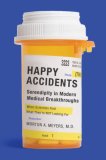Summary | Excerpt | Reviews | Beyond the Book | Readalikes | Genres & Themes | Author Bio

Critics' Opinion:
Readers' Opinion:
First Published:
Mar 2007, 408 pages
Paperback:
Dec 2008, 408 pages
 Book Reviewed by:
Book Reviewed by:
BookBrowse Review Team
Buy This Book
Those instances of rare and belated admissions underscore the deliberate
omission of the creative act that originated the medical discovery. The general
scientific paper simply does not accurately reflect the way the work was
actually done.
At times, one can detect an inchoate longing among scientists themselves for a
forum for recounting the distractions, obstructions, stumblings, and
stepping-stones in the process. Richard Feynman, the plainspoken physicist,
affirms in his 1966 Nobel lecture: We have a habit in writing articles published
in scientific journals to make the work as finished as possible, to cover up all
the tracks, to not worry about the blind alleys or describe how you had the
wrong idea first, and so on. So there isn’t any place to publish, in a dignified
manner, what you actually did in order to get to do the work.
It is not hard to understand why most scientists remain circumspect.
Embarrassment and fear of loss of stature may inhibit them
from making full disclosure. They do not wish to jeopardize their
chances to raise funds, win grants, earn publication, and advance their
careers. It is unsettling for scientists to have to admit that so many
discoveries
came about purely by accident.
Reflecting on nonlogical factors in research, Rothstein concluded
that “there is no body of literature to which one can turn . . . that reveals
or collates the factor of chance and serendipity in research.” It
is precisely this complaint that this book attempts to rectify.
A New Scientific Method?
“Unless you expect the unexpected,” warned the Greek philosopher
Heraclitus, “you will never find truth, for it is hard to discover and
hard to attain.”
Can a serendipitous discovery be predicted? Of course not. We
cannot forecast that something — especially something valuable —
will be found without specifically being sought. Does randomness play
a role? Although chance implies unpredictability, it does not mean total
randomness. In a random occurrence, there is complete absence of
any explanation or cause. Randomness is generally seen as incompatible
with creativity, as improbable as the writing of Hamlet by the
legendary band of monkeys with typewriters in the basement of the
British Museum.
Three things are certain about discovery: Discovery is unpredictable.
Discovery requires serendipity. Discovery is a creative act. In
the words of Peter Medawar:
What we want to know about the science of the future is
the content and character of future scientific theories and
ideas. Unfortunately, it is impossible to predict new
ideas — the ideas people are going to have in ten years’
or ten minutes’ time — and we are caught in a logical
paradox the moment we try to do so. For to predict an
idea is to have an idea, and if we have an idea it can no
longer be the subject of a prediction.
Yet, despite the examples given, and all that follow, medical research
stubbornly continues to assume that new drugs and other advances
will follow exclusively from a predetermined research path.
Many, in fact, will. Others, if history is any indication, will not. They
will come not from a committee or a research team but rather from an
individual, a maverick who views a problem with fresh eyes. Serendipity
will strike and be seized upon by a well-trained scientist or clinician
who also dares to rely upon intuition, imagination, and creativity.
Unbound by traditional theory and willing to suspend the usual clinical
set of beliefs, this outsider will persevere and lead the way to a dazzling
breakthrough. Eventually, once the breakthrough becomes part
of accepted medical wisdom, the insiders will pretend that the outsider
was one of them all along.
So the great secret of science is how much of what is sought is not
actually found, and how much of what has been found was not specifically
sought. Serendipity matters, and it benefits us greatly to understand
the true dynamics of the discovery process for many reasons:
Because we are affected so directly by medical advances. Because directed
research — in contrast to independent, curiosity-driven research
that liberates serendipity — is often costly and unproductive. Because
we need to be sound in our judgment of the allocation of funding and
resources. Because profound benefits and consequences to society may
be at stake. And — perhaps an equally compelling reason — because
we thrill to hear and understand the many fascinating stories that lie
at the intersection of science, creativity, and serendipity.
Excerpted from Happy Accidents by Morton Meyers, M.D. Copyright © 2007 by Morton Meyers, M.D. Excerpted by permission of Arcade Publishing. All rights reserved. No part of this excerpt may be reproduced or reprinted without permission in writing from the publisher.





The House on Biscayne Bay
by Chanel Cleeton
As death stalks a gothic mansion in Miami, the lives of two women intertwine as the past and present collide.

The Flower Sisters
by Michelle Collins Anderson
From the new Fannie Flagg of the Ozarks, a richly-woven story of family, forgiveness, and reinvention.

The Funeral Cryer by Wenyan Lu
Debut novelist Wenyan Lu brings us this witty yet profound story about one woman's midlife reawakening in contemporary rural China.
Your guide toexceptional books
BookBrowse seeks out and recommends the best in contemporary fiction and nonfiction—books that not only engage and entertain but also deepen our understanding of ourselves and the world around us.